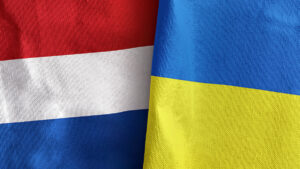
Dutch Prime Minister Dick Schof has announced that the Netherlands will set aside funds to continue supporting Ukraine next year, Western media report.
“The Dutch government will set aside EUR3.5 billion to continue supporting Ukraine in 2026,” Schof said.
According to the prime minister, the funds will ensure the continuity of Amsterdam’s support for Kyiv for the next year, “but if necessary, they can be used this year.”
Schof specified that EUR700 million of the funds would be spent on drones for Ukraine.
Media reports indicate that the previous Dutch government allocated a comparable amount to support Ukraine in 2025, but no exact figures are given.
In addition, in the fall, Amsterdam provided Kyiv with the first batch of the promised F-16 fighter jets.
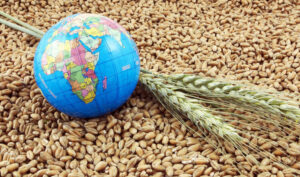
As of March 5, Ukraine exported 29.68 mln tonnes of grains and pulses since the beginning of 2024-2025 marketing year (MY, July-2024 – June-2025), of which 490 thsd tonnes were shipped this month, the press service of the Ministry of Agrarian Policy and Food reported, citing the State Customs Service.
According to the report, as of March 8 last year, the total shipments amounted to 30.989 mln tonnes, including 1.319 mln tonnes in March.
At the same time, since the beginning of the current season, Ukraine has exported 12.155 mln tonnes of wheat (12.375 mln tonnes in 2023/24 MY), 2.126 mln tonnes of barley (1.761 mln tonnes), 10.8 thsd tonnes of rye (1 thsd tonnes), and 14.924 mln tonnes of corn (16.569 mln tonnes).
The total export of Ukrainian flour since the beginning of the season as of March 5 is estimated at 49 thsd tonnes (in 2023/24 MY – 74.9 thsd tonnes), including 45.2 thsd tonnes of wheat (71.1 thsd tonnes).
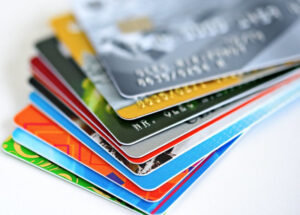
The net profit of Ukrainian banks in January this year amounted to UAH 16.3 billion, the best figure over the past 12 months, but it is 2.7%, or UAH 0.4 billion, less than in January 2024, the National Bank reported on its website.
According to the information, the banking system’s revenues in January of this year increased by UAH 3.4 billion, or 8.2%, to UAH 45.6 billion: interest income increased by UAH 2.7 billion, or 9.4%, to UAH 31.7 billion, while fees and commissions increased by UAH 0.9 billion, or 11.2%, to UAH 9.2 billion.
At the same time, expenses increased by UAH 3.9 billion, or 15.36%, to UAH 29.3 billion, which led to a decrease in net profit, according to the National Bank of Ukraine statistics. Among other things, interest expenses increased by UAH 0.4 billion, or 4.3%, to UAH 10.4 billion, while commission expenses increased by UAH 0.4 billion, or 13.5%, to UAH 4 billion.
Another factor behind the increase was general administrative expenses, which increased by UAH 1.6 billion, or 21.6%.
The strong financial result is also due to insignificant allocations to provisions, which amounted to less than UAH 0.1 billion in January.
Income tax for January this year amounted to UAH 3.4 billion, which is UAH 0.2 billion or 6.8% less than in January 2024.

The Chinese company Jiangling Group Electric Vehicle (JMEV) plans to build an electric vehicle manufacturing plant in Sremska Mitrovica in northwestern Serbia with the long-term goal of exporting cars to the European Union without paying duties. This was reported to Radio Free Europe by Brancica Zjalic, JMEV project manager in Serbia.
“The size of the investment will be determined in the next two months and depends on whether we will produce three thousand or five thousand cars a year,” Zjalic said. She added that Serbia was chosen because of its good economic relations with both China and the EU. “Serbia is a kind of bridge between China and Europe in terms of sales of electric vehicles,” she said.
In October 2024, the European Union imposed high duties (up to 35%) on electric vehicles made in China for five years to protect European automakers from allegedly unfair competition from Chinese manufacturers that benefit from government subsidies.
Serbia, for its part, signed a free trade agreement with China that entered into force in 2024, which has drawn criticism from the EU given Serbia’s status as a candidate for accession to the Union.
Source: https://t.me/relocationrs/542
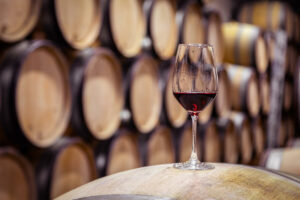
Wine consumption in the world in 2024 decreased by 12% compared to the peak level of 2007, according to a report by Knight Frank.
At the same time, “some of the world’s key wine regions were not affected by this decline.”
The vineyards of New Zealand suffered the most. For example, in the Marlborough region, their value fell by 33% last year from a historic high in 2023, said Kurt Lindsay of Bayleys, Knight Frank’s partner company in the local market.
The value of vineyards in the Los Carneros region in California’s Napa Valley fell by 15% in 2024 compared to the previous year, in Australia’s Barossa Valley and France’s Côte du Rhône region – by 10%.
Wine production has decreased by about 20% over the past 20 years, according to Knight Frank. At the same time, many winemakers still have excess stocks, the Financial Times reports.
According to Lindsay, excess stocks in Marlborough, New Zealand, have led to a decrease in the cost of bulk wine (shipped in large containers and bottled at the destination) from 7 New Zealand dollars ($3.9) to 3 dollars per liter.
In Chile, the price of Pais grapes for balloon wine fell to $0.09 per kg last year, which is about half the cost, says Miguel Torres chief winemaker Eduardo Jordan.
At the same time, premium grape-growing areas, including French Champagne, have retained their value, the FT writes.
In the British Essex, the value of vineyards jumped by 20% in 2024, according to Knight Frank.
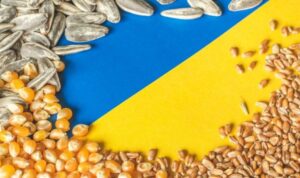
Austria has supported the Grain from Ukraine food initiative by contributing EUR2 million, the press service of the Ministry of Agrarian Policy and Food reports.
According to the report, Minister of Agrarian Policy and Food Vitaliy Koval discussed cooperation in the agricultural sector and the development of trade relations with Austrian Ambassador to Ukraine Arad Benkö. He also thanked the Austrian partners for their contribution to the Grain From Ukraine initiative of President of Ukraine Volodymyr Zelenskyy.
“This is an additional €2 million for food security, which is an important step in supporting countries suffering from hunger,” he said.
The Minister emphasized that European integration is one of the priorities of the Ministry of Agrarian Policy and spoke about the steps already taken on the way to the EU. In particular, the parties discussed the need to work together at the European Commission level to ensure unimpeded exports of Ukrainian agricultural products.
“Austria remains an important trading partner of Ukraine: in 2024, bilateral trade in food and agricultural products amounted to $210 million. Ukraine exported mainly corn, fruit and vegetable juices, soybeans, sunflower oil, as well as frozen fruits and nuts. Instead, it imported chocolate and cocoa products, ready-made sauces, animal feed, corn, and mineral and carbonated waters from Austria,” Koval explained.
The Minister also suggested considering a mechanism to insure agricultural trade operations between Ukraine and Austria against military risks.